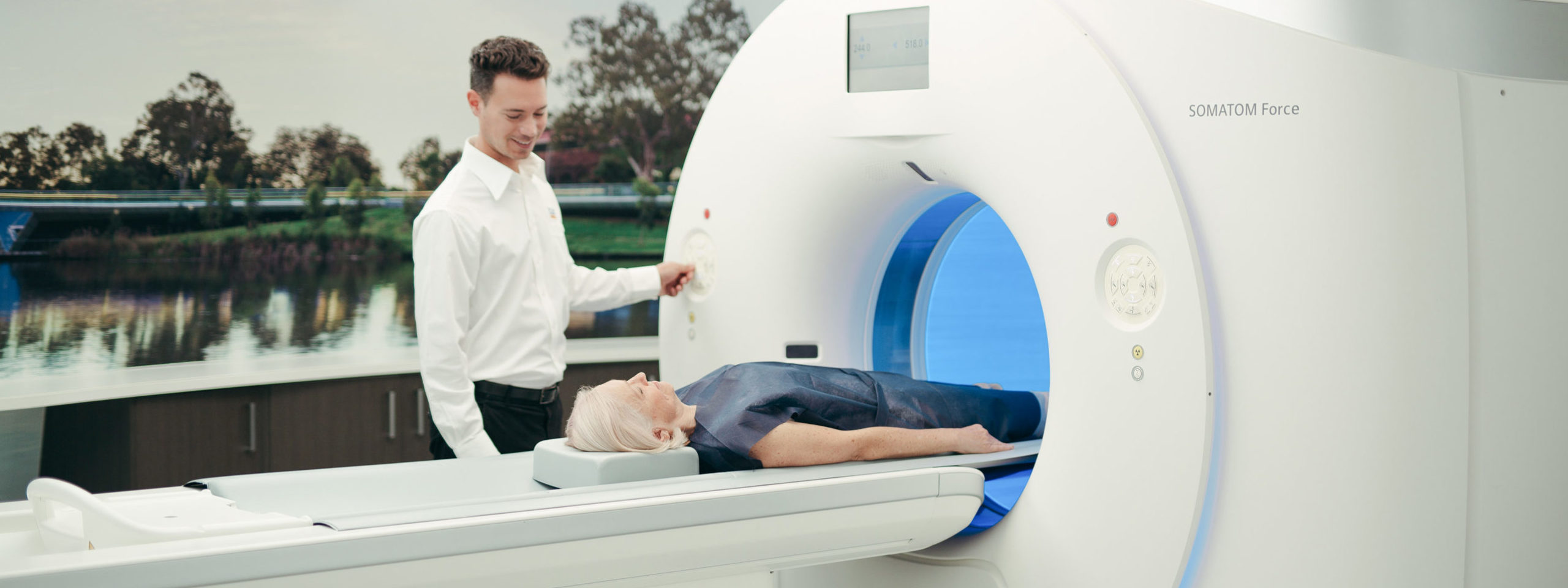Enterography is an examination that takes images of the small bowel. It may be done in either a CT or MR scanner.
Procedure
You will be given fluid called sorbitol (approximately 1.5 litres) which can have a laxative effect which you need to drink before the scan. You will drink it gradually under supervision for 1 hour. The liquid provides better visualisation of your small bowel during the scan.
Once your small bowel has been filled with the sorbitol, you will be taken through to the scanner. A small needle (intravenous cannula) will be placed in your arm to administer a muscle relaxant (Buscopan) to relax your bowel and a contrast dye. If the scan is being done by CT, the IV contrast is iodine-based. If the scan is done by MRI, the contrast is Gadolinium.
For a CT, you will lie on your back in the scanner. The contrast will be injected into your arm and the scan will be done within 5 minutes.
For an MRI, you will lie in the scanner with a special coil over your abdomen and pelvis, which needs to be in the centre of the magnet. Usually, you will enter the scanner head-first. Towards the end of the examination, the contrast dye (Gadolinium) is given so doctors can better see the blood flow to the small bowel. The scan time is approximately 30 minutes.
During the scan, you will need to be as still as possible..
MRI scanners make a loud knocking sound while the images are developed. To reduce the impact of the noise, you will be offered headphones or earplugs. You will also be offered a buzzer to press if you want to talk to the technologist at any time during the scan.
Before your Scan
You will need to fast from food and water for 4 hours before your appointment so that your small bowel is empty for the examination. You will be asked to arrive at your appointment 1 ¼ hours before you are due on the scanner in order to prepare you for the examination. When you arrive, you will be asked to fill out either a CT contrast consent form or an MRI safety questionnaire.
Before the procedure, you may be asked to change into an examination gown for your comfort, and to ensure clothing does not affect the imaging. You may also be asked to remove jewellery, eye-glasses and any metal objects that might interfere with the imaging.
Duration
In addition to the hour before the scan to drink the sorbitol, the scan time is 5 minutes if you have a CT, or approximately 30 minutes if you have an MRI.
After the procedure, you are monitored for 15 minutes before the cannula is removed and you are able to leave the clinic.
Risks / Side Effects
As part of the MRI examination, you will have an injection of a contrast agent (dye) known as Gadolinium. This medication is administered intravenously (injection into vein) through a needle. Overall MRI contrast injection is a safe procedure. Occasionally patients feel a little nauseous but this only lasts momentarily. More serious allergic type reactions, although possible, are extremely rare. The staff in the MRI department are fully trained to deal with such a reaction should it occur.
The mix of water and sorbitol (laxative) may cause diarrhoea.
Buscopan is a relatively safe drug used to relieve stomach cramps. Possible side effects of Buscopan include dry mouth, blurred vision, itchiness, drowsiness and increased pulse rate. If you experience any of these, they should pass quickly. Rarely, it can cause an inability to pass urine. In patients with untreated or unknown glaucoma, it may cause a red, swollen eye. If you experience pain in the eye or deteriorating vision, please go to an emergency department.
An IV contrast injection is used for CT.
When the injection goes in you may have a warm feeling in the face, neck or pelvis. This usually lasts for a brief period then disappears. These feelings are normal and not an allergic reaction. Occasionally (<1%), mild allergic reactions such as a rash, hives or sneezing can occur. These usually develop at the time of scanning, do not require treatment and settle rapidly. Sometimes a mild reaction such as a skin rash may occur from 1 hour to 1 week after injection.
Less commonly (<1 in 100,000 patients), more severe reactions can occur including asthma or shock. Severe, life threatening reactions up to and including death have occurred but are extremely rare. In the event of a reaction, we have equipment and trained staff available to begin immediate treatment. Read more information on IV contrast.
Are you ready to make your CT (Computed Tomography) Scan appointment?
Our online booking platform allows you to quickly and easily make an appointment online.


